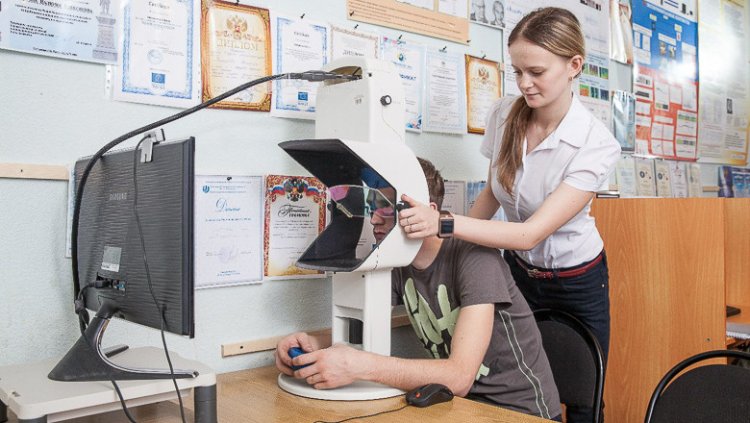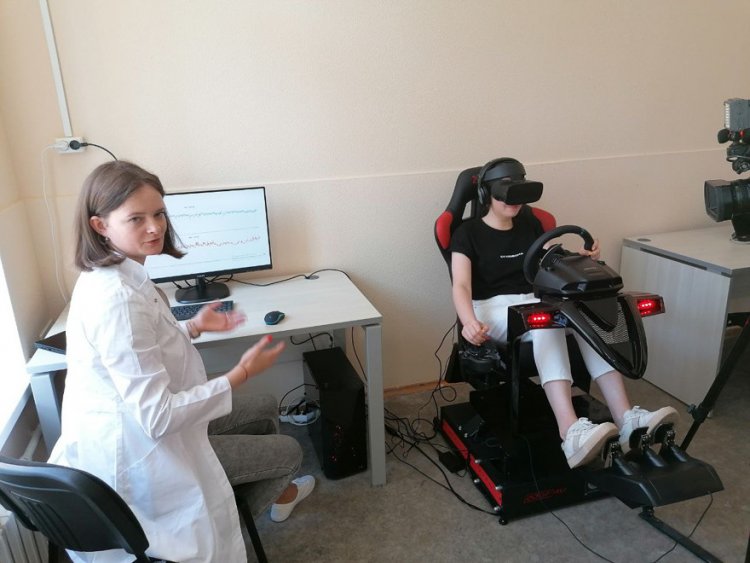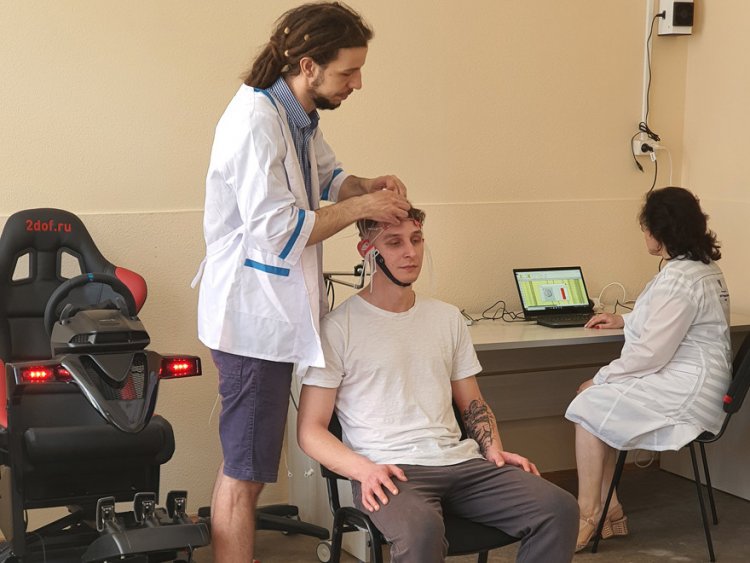Digital technology is changing every sphere of our lives. Science and education are no exception. Αt the end of last year,the State University of Nizhny Novgorod launched a new training program – a cyberpsychology program. We have spoken to the program manager, Valeria Alekseevna Demareva, Candidate of Psychology.
– Is cyberpsychology a multidisciplinary science?
It’s a multidisciplinary branch of psychology that was born not so long ago. The first research in cyberpsychology dates back to the early 20th century. Now that we're going through an era of rapid development of new technologies and mass transition to “life online,” cyberpsychology has never been more relevant. Cyberpsychology is related to a number of sciences, such as sociology, communication studies, philology, IT studies, physics, and mathematics. That is, cyberpsychology is a highly multidisciplinary branch of knowledge.
– How is it different from media psychology? The media are means of communication, while the cyber environment is online space. Does it mean that media psychology is a bit broader?
Not quite, there is a lot of overlapping between the two. At the Lobachevsky State University of Nizhny Novgorod, we take a broader view of cyberpsychology. Amongst other things, cyberpsychology is about how to advise IT specialists – something that media psychology doesn't address. Media psychology is looking into online relations and how web products affect people. But cyberpsychology also covers other aspects, which are not part of media psychology. Someone may have a different understanding of cyberpsychology. For example, if we open Wikipedia, we’ll read that media psychology is practically a synonym to cyberpsychology. But we are looking at it broadly.
– A cyberpsychologist doesn’t act just like a psychologist does, since they don’t just interact with humans, right?
We consider the cyberpsychologist a mediator in the process of interaction between a person and the entire virtual environment in the broadest possible context and understanding. This includes social media, virtual reality apps; there is even an automobile environment. Sensors and applications in a motor vehicle are VR as well, therefore to us the cyberpsychologist is a mediator or a go-between in the dialog between a person and a virtual environment.
– Is there a straight answer to the question of whether the Internet is harmful for people?
Of course, not. We can’t just say that the Internet is a bad thing. First of all, the Internet offers a lot of opportunities: not just for self-development but also for (self-)rehabilitation and adjustment; it provides a way of joining groups for those who can’t do it in another way due to some physical issues. That is, if used correctly, the Internet is a good thing. But there comes the issue of the correct dosage of our time online, the question of how to organize one’s working day if we’re speaking about the fact that the cyberpsychologist may advise IT specialists on time management, for instance.
I would say that the Internet is a good thing overall, but we need the right approach to it.
– The American researcher Nicholas Carr is studying the human ability to think and remember. According to him, people in the future will have fragmented minds, low concentration, and impaired emotional sphere. Are the prospects really so sad?
Nicholas Carr has written a lot on split and mosaic thinking, but we should remember that he writes about the issues that have been observed and those that may arise. He doesn’t write that it’s all bad and that everyone is so bad and has mosaic thinking to the extent that they cannot function in the society. What we’re talking about is risks brought by the virtual environment and the ubiquitous Internet. In this regard, I support Nicholas Carr and researchers citing him in that the main driver of this process and mosaic thinking is the fact that we’re increasingly going back to the visual. Children used to read a lot, but now online platforms, simulators, and gamification elements are being promoted everywhere. The verbal component is being gradually supplanted by the visual component. Children get used to images from the very early age; they can’t keep focus for a long time because they have never lived in another environment. They see one thing quickly replaced by another. Even if we were to turn on the TV now, we would see a set of commercials aired one after another, each with its own, unconnected message. We scroll down our Instagram feed where messages are unrelated as well. All in all, there is retraining going on. This is how our brains are working now; there is nothing bad in that. We are able to receive more information, albeit with low quality.
Essentially, our brains work a bit differently now. We used to do high-quality processing of a small amount of information while now the processing quality is lower but there is a huge amount of information. No one would deny that we live in an information boom era.
– Cyberspace is a reality inside our reality, in which people can work, learn, and have fun. Is this good or bad for socialization?
I would say it is good as an extra tool. For instance, we shouldn’t have fun in cyberspace only. We should go outside and interact with people because the very process of interacting in cyberspace is not the same as real-life interaction, even if it’s with the same people. Because it’s a totally different situation psychologically. And the psychological characteristics of such interactions are quite different. What we can write to a friend on social media is different from what we can say to their face.
Let’s take another example – someone is building their persona in cyberspace and creates a fake page depicting themselves as a muscular, gorgeous guy with a sharp tongue. That’s a compensation for what he lacks in real life. In reality, he might be a slim young man, who would never challenge anyone.
That is, cyberspace offers more possibilities for self-presentation, but we shouldn’t forget that we must not lose ourselves but should always get back to the real environment.
It’s good to study online and then go and discuss the topic you’ve been studying on an online platform with someone – this would reinforce the material on another level and in another context. Then the learning process would be closer to being optimal.
It’s hard to say about work since there is another wave of the pandemic going on now, with people getting sent to work remotely once again. We will all be compelled to work in cyberspace, but it can't be helped. I would advise reading something on how to make your schedule in a virtual environment, because when you work in an office, you have an established routine with lunch and other breaks. But when you're at home, you can just get lost. Many people work too much, disrupting their sleeping routines. These are very dangerous things, which are even discussed in newspapers, e.g., multiple articles were published in The Wall Street Journal during the pandemic, on how to avoid losing yourself while working online. In that sense, cyberpsychology is most relevant. Among other things, we would like to train specialists who would be able to help people organize their day when working remotely.
Cyberpsychology Lab at the Lobachevsky State University of Nizhny Novgorod
Cyberpsychology Lab at the Lobachevsky State University of Nizhny Novgorod
– Does communication online make people less emotional?
This is a very complicated issue. All in all, the answer may be yes. Because empathy is different when we are dealing with another person face-to-face and when there is a go-between – a computer, a social network. However, if a person has lost themselves in a virtual environment by creating their online persona and merging with it, that person might be quite unemotional in real life, talking dryly and not showing any signs of an emotional individual, while in the virtual domain they might have gotten into the role of a tough and passionate person and started acting too emotionally. This is a fine question that should be looked at from different perspectives.
– As we said before, all processes have moved to the cyber environment now. Including informal social interactions. I can't help but ask you about dating apps, which are popular today. Why do people prefer meeting each other via dating apps? Is this the influence of the global transfer to the Internet?
Of course, one could dispute that the transfer to the Internet is global. There are also regulations in that area imposed by the authorities to ensure our security during the pandemic. We shouldn’t forget, however, that there were dating sites before. I remember, when I was little, there was a ticker tape crawl with “lonely hearts” texts on the TV screen. There have always been people who needed such services. It's easier now – new downloadable apps for gadgets are released every day. This is just the way some people meet their social communication needs. Some people cannot start a conversation with an unknown person in the street, others find it difficult to communicate offline – so they go online. I am not aware of any precedent where someone got married or started a family thanks to a dating app.
I believe that people just use them to get what they lack in real life. They just tap some resources, e.g., in terms of emotion, but none of that has anything to do with finding a partner or starting a family. But this is just my opinion.
– Is Internet addiction exaggerated or is it really a psychological issue?
Addiction is a psychological problem, of course. There has been a lot of research done on this aspect. I don’t think the problem has just emerged now, during the pandemic. Naturally, there are especially sensitive periods for this addiction – the time when teenagers have come back home from school and do not feel like doing homework. They would rather socialize and play with someone. Plus the adolescence crisis when they don’t want to discuss some things with their parents but can discuss them with their classmates non-stop.
I wouldn’t say that the Internet addiction has just become a global issue. It may have attracted more attention now.
Adults are also susceptible to this addiction now. If a person is “locked in” at home during the lockdown and cannot find an occupation, they may leave for the cyberspace and get lost online. In such cases, it takes a cyberpsychologist and counselor to get such a person back to the offline world and show them its value. Or values that may replace those the person is looking for online.
– Many people say that the problem is not addiction but lack of good time management. Is it so?
I think so, and this has been mentioned multiple times today. With regard to adolescents, the parents should be more involved, monitoring what their child is doing online, and trying to organize the kid’s day.
As for adults, the issue is not addiction but how to avoid going insane while working remotely. Yes, time management and self-organization are most important qualities that should be developed in a general sense. However, people also need counselors to help them organize their life in cyberspace.
– They say that every new generation is more capable of multitasking. Isn’t it harmful?
This is our reality; there’s nothing we can do about it.
We live in an era of an information boom, bombarded with information from all sides.
If a manager is in a meeting, he may receive messages from his superiors on his messengers, to which he has to respond. That means that people are torn apart, trying to handle multiple active information sources. There’s nothing we can do about it. We have to multitask, which again brings up the issue of split and mosaic thinking. That’s how our brains work: we process information fast, in large volumes, but with inferior processing quality. We will never be able to have all three aspects on the same level, i.e. to process fast, well and much. Such things don't happen. Something always has to take a back seat. Sadly, our era does not favor the quality, processing, and production of information.
– Is it true that our brains are forced to transform when functioning in such a cyberspace?
Our brains are very flexible. The human brain can adapt to the nature of information flows it has to deal with. I agree with you that the brain is forced to respond to the current information flows, their volume and speed.
– Many people move to video platforms such as TikTok, YouTube, as spaces to take a rest from such information flows. Are they really a good distraction or do they actually make us more tired?
The latter I’d say. The social media such as Instagram and TikTok are flickering multiple pieces of information unrelated to each other. Trying the escape our work environment with global multitasking and continuous information flow, we end up in a similar place, just dressed up in the garb of entertainment. But it is the same thing to our brain – flashes of unrelated pieces of information.
– How can we give our brains some rest then?
This is no secret and many websites on psychology say that it’s good to just take a walk or read something – to move away from the source of numerous pieces of unrelated information. Even the TV isn’t like Instagram with its flashes of information. A person who doesn’t like reading and walking, might sit down and watch a movie without commercials. That would be a rest and information of a different quality, with something to think about, and plot lines to follow for hours. That would be a rest for the brain as it would switch to another mode.
But actually, it’s better to just go out for a walk before going to bed, which would be a huge dose of rest for the brain.
– What do we need to know in order to act safely for our brain in cyberspace?
First of all, we should know that everything has to be dosed. Everyone should make a plan saying what they are doing in cyberspace and what it gives them. There should be this element of reflection: What am I doing in cyberspace and what is my reward? If it’s work, it’s one thing: a programmer has to work sitting at their computer all day. But even so, programmers should do it right: work for a while, then a 20-minute break with a complete disconnection from the cyberspace, a coffee and a distraction. Perhaps, a short walk and then – back to work. As for children, I believe that the parents should know a lot and read many things on how to make cyberspace safe for their child. Leading by example, they should show the right way to act in cyberspace, and offer essential advice that the adolescent could follow starting right now.
The photos were provided by the speaker

























